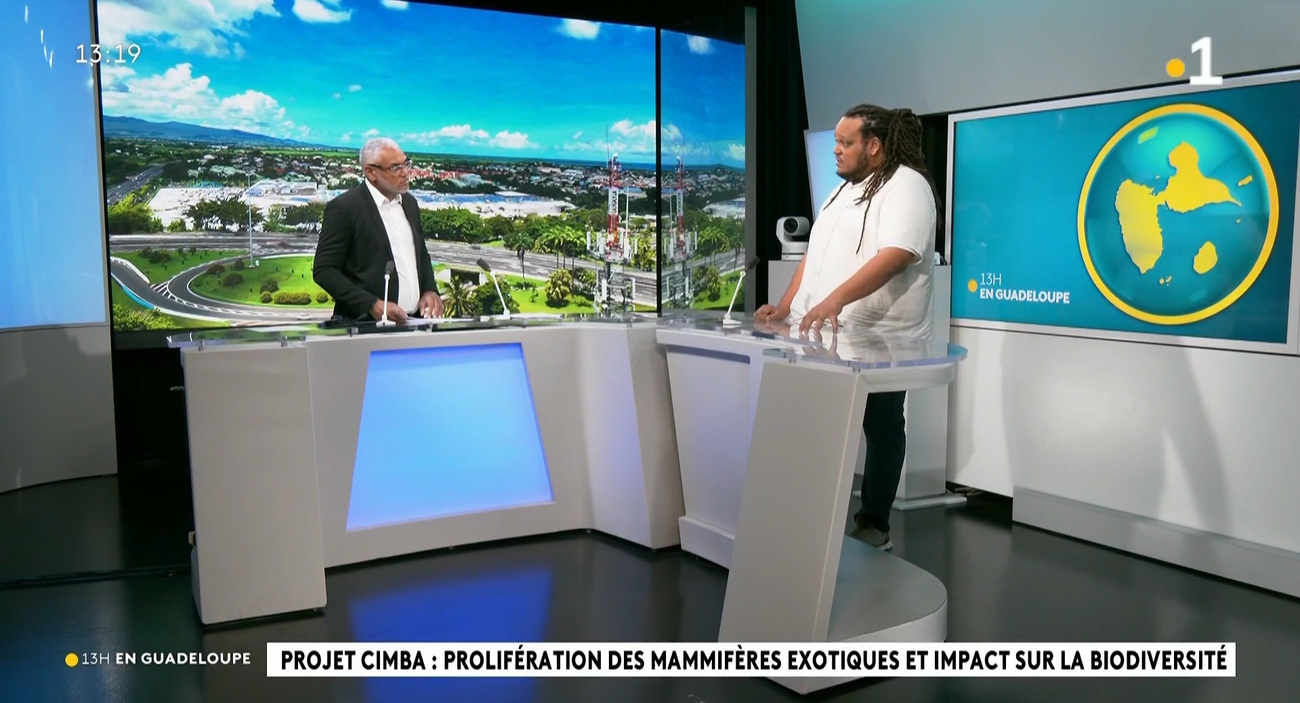To mark the recent launch of our CIMBA project, an official kick-off event was held on Monday, February 17, at the Caribaea Initiative headquarters in Guadeloupe. This event brought together the press and numerous stakeholders committed to biodiversity conservation, demonstrating the strong interest in this ambitious initiative.
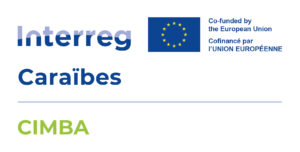 The CIMBA project aims to better understand and mitigate the impact of exotic mammals on the fragile insular ecosystems of the Caribbean. These species—including rats, mongooses, and stray cats and dogs—pose a direct threat to many native species, particularly reptiles, amphibians, and endemic birds.
The CIMBA project aims to better understand and mitigate the impact of exotic mammals on the fragile insular ecosystems of the Caribbean. These species—including rats, mongooses, and stray cats and dogs—pose a direct threat to many native species, particularly reptiles, amphibians, and endemic birds.
Through a rigorous scientific approach, the CIMBA project relies on field studies and innovative methods to track the distribution and impact of exotic mammals, analyze their diet, and optimize control strategies. The project also promotes strong regional cooperation between Guadeloupe, Haiti, and the Dominican Republic, alongside an awareness campaign to encourage public support for conservation efforts.
A launch marked by strong partner engagement
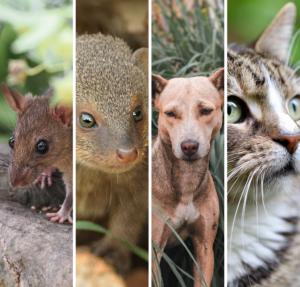 Having started in late 2024, the project was officially presented to a diverse group of key biodiversity stakeholders during a launch event on February 17, 2025, at the Caribaea Initiative headquarters. Among the distinguished guests, we had the honor of welcoming representatives from Interreg Caraïbes, the project’s main financial partner, whose support has been instrumental in bringing CIMBA to life.
Having started in late 2024, the project was officially presented to a diverse group of key biodiversity stakeholders during a launch event on February 17, 2025, at the Caribaea Initiative headquarters. Among the distinguished guests, we had the honor of welcoming representatives from Interreg Caraïbes, the project’s main financial partner, whose support has been instrumental in bringing CIMBA to life.
Other attendees included representatives from the Guadeloupe National Park, the Regional Biodiversity Agency, the National Forestry Office, the CIRAD, the University of the Antilles, the Pasteur Institute of Guadeloupe, the Domaine Canin, the Guadeloupe Zoo, the Guadeloupe Hunting Federation, and the Guadeloupe DEAL. This broad representation highlights the project’s interdisciplinary approach to tackling the challenge of invasive exotic species.
A morning of presentations and engaging discussions
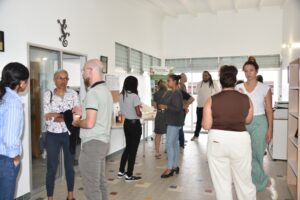 Following a welcoming session that encouraged initial discussions among participants, guests were invited into a conference room decorated in CIMBA’s colors, where a large kakemono banner had been specially printed for the occasion. Christopher Cambrone, Scientific Coordinator at Caribaea Initiative, then took the stage to introduce the key objectives of the CIMBA project. His presentation covered the project’s goals, methodology, expected outcomes, and emphasized the importance of collaborative efforts between institutions. He also highlighted the need for increased public awareness to ensure community engagement in conservation actions. Additionally, Yuna Mélane, a PhD student working on the project, shared insights into her research, which directly contributes to CIMBA’s objectives.
Following a welcoming session that encouraged initial discussions among participants, guests were invited into a conference room decorated in CIMBA’s colors, where a large kakemono banner had been specially printed for the occasion. Christopher Cambrone, Scientific Coordinator at Caribaea Initiative, then took the stage to introduce the key objectives of the CIMBA project. His presentation covered the project’s goals, methodology, expected outcomes, and emphasized the importance of collaborative efforts between institutions. He also highlighted the need for increased public awareness to ensure community engagement in conservation actions. Additionally, Yuna Mélane, a PhD student working on the project, shared insights into her research, which directly contributes to CIMBA’s objectives.
The event fostered rich discussions, with valuable contributions from various partners. The diversity of perspectives helped initiate insightful exchanges, paving the way for fruitful collaborations moving forward.
Successful media coverage
The launch event received strong media attention, thanks to the presence of several journalists. Following the event, Christopher Cambrone was invited to speak live on Guadeloupe La 1ère during the 1 PM news broadcast, where footage from the morning’s event was also aired.
- Link to the article and replay: https://la1ere.francetvinfo.fr/guadeloupe/cimba-un-projet-d-envergure-pour-comprendre-et-controler-les-mammiferes-predateurs-de-la-caraibe-1562503.html
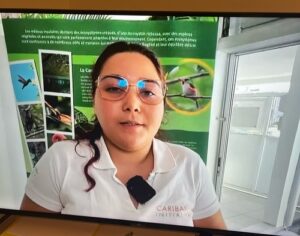
Meanwhile, Yuna Mélane was interviewed in Creole for the JTI Kréyol evening news, also aired on Guadeloupe La 1ère. Additionally, the newspaper France Antilles published two articles on the event in its environment section a few days later.
- Link to the 1st article: https://www.guadeloupe.franceantilles.fr/actualite/environnement/une-etude-determinera-limpact-des-mammiferes-exotiques-sur-la-biodiversite-locale-1024419.php
- Link to the 2nd article : https://www.guadeloupe.franceantilles.fr/actualite/environnement/un-projet-scientifique-en-faveur-de-la-biodiversite-caribeenne-1024617.php
A promising start for the project
We are thrilled to have officially launched the CIMBA project in front of such a diverse and engaged audience. We extend our heartfelt thanks to all attendees for their support and involvement. This launch event marks a strong beginning for CIMBA, reinforcing the collective commitment necessary to preserve the Caribbean’s unique biodiversity.
More information about the project: http://www.cimba-project.com/
The CIMBA project is co-financed by the Interreg Caraïbes program under the European Regional Development Fund (ERDF).

